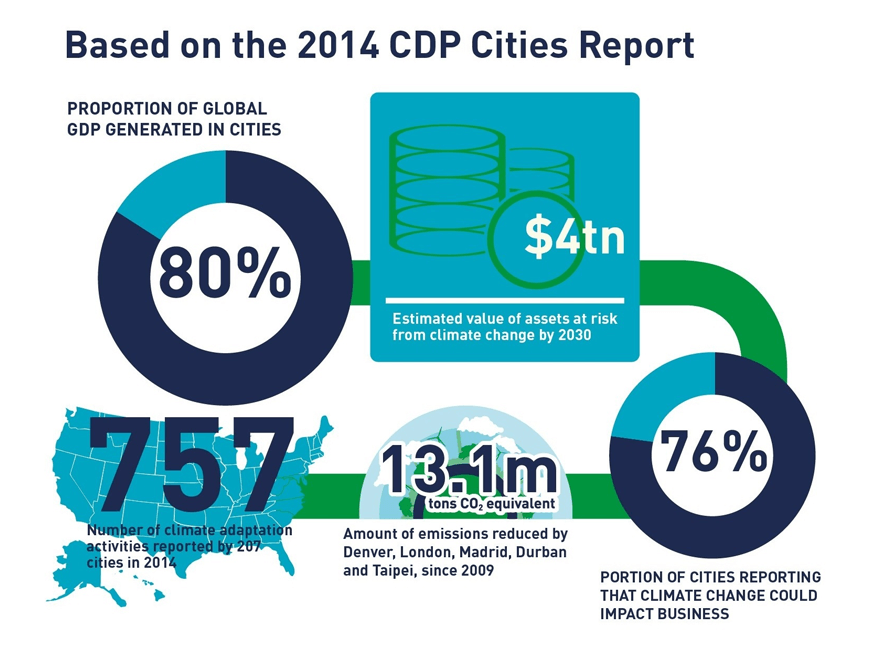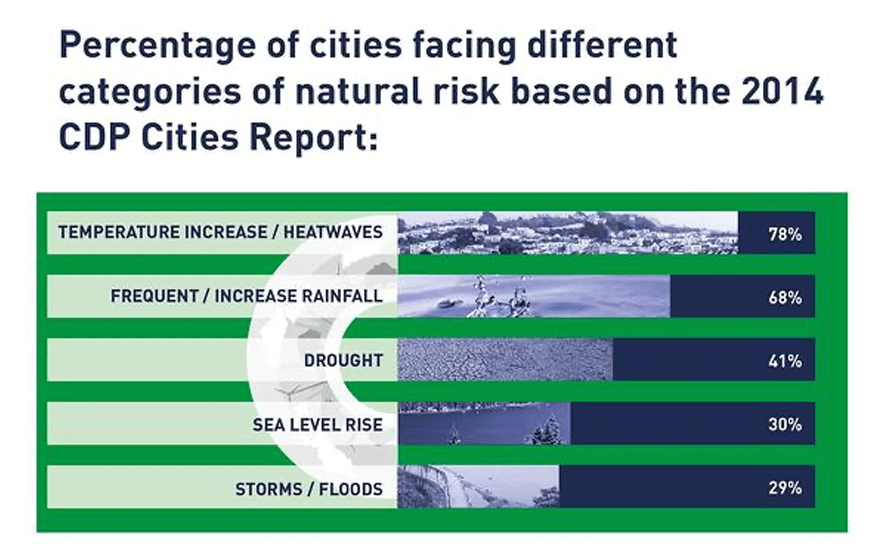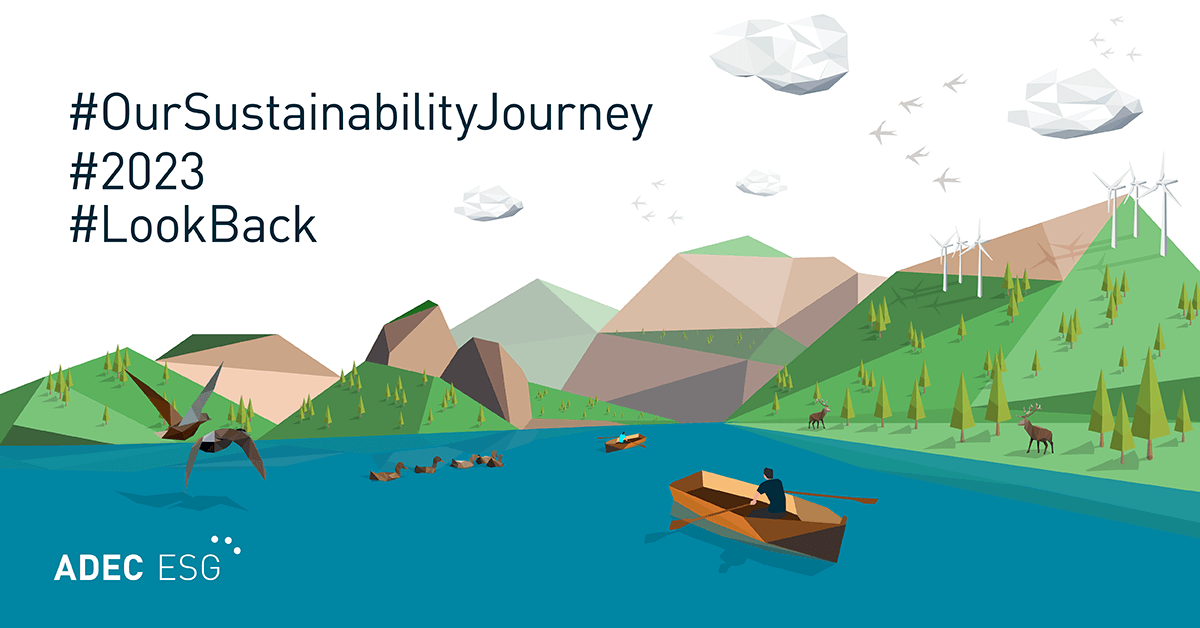Businesses know the importance of sharing their environmental data; the collective information gathered helps bring about a solution towards mitigating climate change risks, lowering environmental impacts and increasing stakeholder confidence. The same premise applies to the cities where these businesses operate from and where employees of these businesses live.
Cities, just like businesses, emit greenhouse gasses (GHG), consume electricity, use water and fossil fuels, and generate waste – in huge quantities to accommodate the population residing and working within its borders. CDP recognizes this and has created a reporting program named CDP Cities.

Launched in 2011, City Governments have since used the CDP Cities platform to report their emissions data. Participating cities have the benefit of being able to see what other cities have done to address rising carbon footprints, manage the use of finite resources like water and fossil fuels, and integrate these best practices into their own sustainability initiatives. Furthermore, they have become more aware of the threat climate change has over businesses within their boundaries, the city’s residents and the city’s economy.
This year, with an unprecedented number of participants, CDP has released its fourth CDP Cities Annual Report entitled Protecting Our Capital: How climate adaptation in cities creates a resilient place for businesses. In partnership with Bloomberg Philanthropies, C40 Cities and AECOM, this report shows the data provided by 207 cities of varying sizes and demographics from Africa, East Asia, Europe, Latin America, North America, South Asia and Oceana.
The information from such a diverse group allows the report to address more issues and challenges that cities face when it comes to sustainable practices, lowering carbon footprints and GHG emissions, and subsequently attracting businesses and investors. It also shows that the potential impacts of climate change affect a wide variety of industries and sectors including food production, the service industry, ports and public health.
If, for example, a city gets hit by a hurricane with a strong enough category to create substantial damage to infrastructure and cause flooding in low-lying areas, then a domino effect is triggered causing social impacts inside the city. Health impacts could follow when basic necessities become scarce. Businesses and city governments are intricately intertwined in mitigating risks brought about by climate change. The cities that participated in the report represent a population of almost 400 million people who work and reside there. That’s 400 million lives on the line if cities and businesses do not take action on or prepare for these risks.
An estimated US$4 trillion worth of assets are at risk from climate change and 76% of the reporting cities have acknowledged that climate change could impact businesses. Non-action is not an option, which is why businesses and cities have joined forces to face climate change risks together. Further, local governments are adopting actions towards making their cities attractive to stakeholders and boost business resilience.

Larissa Bulla, Head of Cities at CDP, says “Cities are recognizing that where they have improved their resilience they are much more business friendly. So, to enable them to have access and understanding of what risks their local businesses are facing is definitely a motivator for cities.” In fact, the CDP Cities Report shows that cities acknowledge or recognize 75% of the major risks businesses report.
By working together in addressing risks such as drought, frequent or intense rainfall, heatwaves, rising sea levels, storms and flooding, businesses and local leaders can easily boost investor confidence. This is a best practice that other cities can follow if their goals of business resilience are to be achieved. The CDP Cities Report shows that by doing so, the risks businesses face within the city are reduced by 66%.

It should be noted, however, that the way risks are viewed or assessed by businesses is different from city officials’ point of view. Some businesses may be spared the risk of flooding because of their location, for example, but no matter where in the city the flooding occurs, it is an impact the city officials or local government have to deal with.
The report shows that cities are taking steps towards creating climate adaptation actions that both reduce the risk of climate change and help businesses grow and prosper. It’s a two-way street. On one hand, local officials are responsible for keeping their bottom lines healthy through good governance, public service and investing in infrastructure. On the other, businesses should integrate climate adaptation actions into their operations all the way down to their supply chains to improve their chances should the impacts they are preparing for become a reality.
A total of 54% of the participating cities in the CDP Cities Report have created initiatives to curb emissions from the transport sector; 46% are addressing to lower the energy consumption of buildings within their cities; and 37% are looking into projects that will lessen the amount of waste being produced. These numbers show promise towards achieving reduced emissions in cities worldwide.
FirstCarbon Solutions (FCS) provides expert advice to mitigate climate change risks and reduce carbon footprints. Organizations working with FCS have been able to meet environmental goals, streamline operations, reduce costs and improve bottom lines. FCS is a Gold Consultancy and Silver Software Partner of CDP, the exclusive Scoring Partner for the CDP Supply Chain Program since 2011 and a Scoring Partner for the CDP Climate Change Program.





